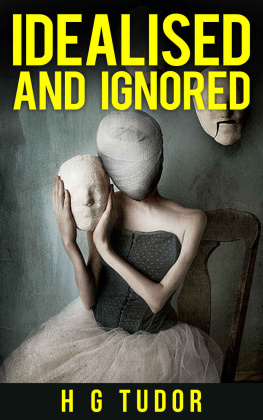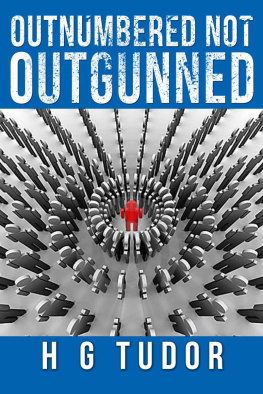H.G. Tudor - Idealised and Ignored
Here you can read online H.G. Tudor - Idealised and Ignored full text of the book (entire story) in english for free. Download pdf and epub, get meaning, cover and reviews about this ebook. year: 2016, publisher: Independently published, genre: Religion. Description of the work, (preface) as well as reviews are available. Best literature library LitArk.com created for fans of good reading and offers a wide selection of genres:
Romance novel
Science fiction
Adventure
Detective
Science
History
Home and family
Prose
Art
Politics
Computer
Non-fiction
Religion
Business
Children
Humor
Choose a favorite category and find really read worthwhile books. Enjoy immersion in the world of imagination, feel the emotions of the characters or learn something new for yourself, make an fascinating discovery.
Idealised and Ignored: summary, description and annotation
We offer to read an annotation, description, summary or preface (depends on what the author of the book "Idealised and Ignored" wrote himself). If you haven't found the necessary information about the book — write in the comments, we will try to find it.
Idealised and Ignored — read online for free the complete book (whole text) full work
Below is the text of the book, divided by pages. System saving the place of the last page read, allows you to conveniently read the book "Idealised and Ignored" online for free, without having to search again every time where you left off. Put a bookmark, and you can go to the page where you finished reading at any time.
Font size:
Interval:
Bookmark:
Idealised and Ignored
By
H G Tudor
All Rights Reserved
Copyright 2016
Idealised and Ignored
By
H G Tudor
All rights reserved. No part of this book may be reproduced, stored in a retrieval system, or transmitted in any form or by any means, electronic, mechanical, photocopying, recording, or otherwise, without the express written permission of the publisher.
Idealised and Ignored
The up and the down. The highs and the lows. The elation and the misery. When one becomes entangled with our kind it is a hallmark of the narcissistic dynamic that the victim will experience being placed on a pedestal and then knocked from the pedestal with no warning or notice, to be left writhing in pain in the dust, none the wiser as to why this fall from grace has happened. Why do our kind engage in this behaviour? Why we do deploy this splitting where we consider you in white as the hero and then suddenly in black as the zero? Let us consider why we idealise you.
Before we get into the meat of such a discussion it is worthwhile considering this manipulation (and that is what it is) in terms of its applicability to the type of appliance that we have attached to. Our kind have so many different appliances which we connect to and regard as extensions of ourselves. We idealise all of our appliances, whether they are tertiary, secondary or primary. The extent of the idealisation increases from tertiary through to the primary based on the dosage of fuel each source provides increases through those groupings.
If a tertiary source provides us with fuel, for example, a stranger smiles at us as we enter a lift, then we are automatically better predisposed to that individual. The spark of fuel that they have provided means that we regard that stranger as a good person. They have provided us with fuel, they have admired us, they have validated our existence and therefore we idealise them. Admittedly, the pedestal will not be tall and once we have exited the lift we may not ever see them again, but that is not the point. The idealisation lasts for as long as the encounter. It will encourage us to engage in conversation with that person in order to draw further fuel. We will be charming towards this person and as a consequence we hope they will respond with further expressions, words and actions which provide us with positive fuel. They are on a pedestal. They can do no wrong because they are giving us fuel, which is what we need. It does not matter that this interaction is transient in nature, fuel is all that matters. It might be the case that we see a further opportunity to gain more fuel from this individual and we ask that person for their telephone number. If it is provided, then we will engage with this tertiary source further and this may well result in their promotion into a secondary source through the swift passage of time and the application of our seductive charms.
Similarly, with a secondary source we idealise those who we categorise as belonging to this group. This will include family, friends and colleagues. If the members of this group comply and supply us with one or more of the three elements that we require (fuel, traits and the residual benefits) then they too will be placed on a pedestal because in our minds they are good people because they are doing what they want. The pedestals that we place our secondary sources on are higher than those of the tertiary sources. This is because the secondary sources provide us with more fuel, they provide it more often and of a better potency that tertiary sources. Whilst a tertiary source may well provide us with characteristics and traits and residual benefits (such as money, accommodation, resources etc.) this is rarer than the secondary sources. Accordingly, secondary sources are of a greater benefit to us across the board and especially in respect of that most important of all resource; fuel. This means that our secondary sources are placed on pedestals and idealised because they allow us to function, they provide us with what we want and need, they comply with our wishes. The secondary sources provide us with the members of our coterie and they also provide us with our lieutenants. These people are loyal, supportive and carry out our wishes. They assist us with gathering information about a prospective target for a primary source. They carry out the smearing of discarded primary sources, they form the faade and they are therefore valued for everything they do for us and can give to us. Thus we continue to idealise them. They understand our worth. They praise us, they support us, they admire us, they love us, they compliment us, they applaud our actions and laugh at our jokes. We have an image of how we want the world to regard us. We want to be revered, admired, the centre of attention and our secondary sources engage in all of the actions and steps required which form this image. Accordingly, since they function as we want them to, they are idealised.
This idealisation does not manifest in any gushing praise for them, but we will speak well of them, look to assist them and do them favours, because by doing so we are able to maintain their loyalty to us and their continued compliance. If they do what they want, we idealise them and they will benefit and in turn we continue to benefit from their fuel, provision of character traits and residual benefits.
When we consider the role of the primary source, this is where the issue of idealisation comes to the fore. It is also invariably the situation that most victims of narcissists identify with the most. The identification of a primary source who is almost always an intimate partner means that we have targeted somebody who we truly believe will service all of our fuel needs, as well as provide traits and residual benefits. Since the primary source is the main provider of our fuel, this fuel supply needs to be extensive, frequent and potent. We are highly attuned to identifying and seducing people who will provide us with the high level of fuel that we need. Whether this person is an empath, super empath or co-dependent, they have the necessary traits which signal to us that this is a veritable reservoir of fuel waiting to be tapped. This person is the solution. Solution to what?
The void which lurks inside us must be filled. It must be filled with fuel because as it is filled with this fuel it allows us to function. It allows us to feel powerful so that we can do two things. We can display to the world the person we want the world to see and it also allows the creature to be imprisoned. Accordingly, when you are identified as the primary source of our fuel, you are an angel in our eyes. You have saved us; you are the one. You are going to provide us with the very thing that will stop us from feeling weak, restless and fearful. You will keep the creature at bay through the provision of your fuel. You will allow us to shine, be brilliant, be charming and wonderful, just as we want to be. You are the conduit to all of this and therefore we idealise you. We need this fuel. There is no hope for anything else and the provision of it in the manner that we require provides relief form the fear of oblivion, of ceasing to exist as we wish to exist. We need not be consumed by the creature in the abyss but instead we can rise above it all, stand tall, remain omnipotent, glorious and formidable. You enable this to happen and to that end we place you on a pedestal.
This also happens because we have never had any realistic understanding of what it is to be loved or to love. As a consequence of this we have evolved in a manner whereby we must feel powerful. In order to feel powerful, we require fuel. You are the provider of that fuel. Yes, there are other providers, the appliances that form the secondary and tertiary sources and they all have a role to play, hence we idealise them too, but not in the way that we idealise you. Since you are giving us the very thing that we need and want, we consider that to be the supreme condition. You can do no wrong in our eyes. You are everything that we want and need. We have not learned to understand love in any other way other than in this manner through which we have evolved.
Next pageFont size:
Interval:
Bookmark:
Similar books «Idealised and Ignored»
Look at similar books to Idealised and Ignored. We have selected literature similar in name and meaning in the hope of providing readers with more options to find new, interesting, not yet read works.
Discussion, reviews of the book Idealised and Ignored and just readers' own opinions. Leave your comments, write what you think about the work, its meaning or the main characters. Specify what exactly you liked and what you didn't like, and why you think so.

















